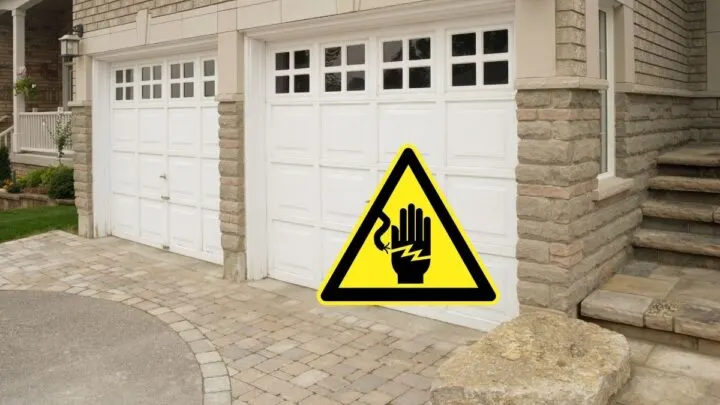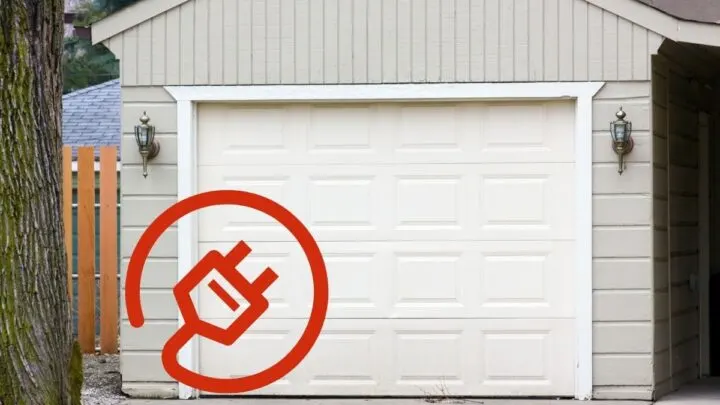If you have spent any time in your garage, you may have noticed that the outlets in the garage differ from the outlets in the house. These are GFCI outlets and contractors have to put them in by law.
All outlets inside a garage are required to be GFCI protected. These outlets are critical, as they can detect abnormal electrical currents and shut down flowing electricity within 1/40th of a second to prevent accidental electrocutions.
Once people learn about GFCI outlets, they may want them all over their home. It protects people, especially young children and those with cognitive issues, from death by electrocution.
If you do not have working GFCI outlets in your garage, an electrician can replace the current outlets with GFCI outlets.
What to Know About GFCI Outlets
As first-time homebuyers walk around their new home, they will notice that the outlets inside the garage differ from the outlets in their home.
Garage outlets are very similar to those in a hotel, as hotels have to have the safety features as well.
Outlets in the house and in the garage are not under the same building code.
All garage outlets, and outlets that are near water, have to be GFCI outlets.
What Are GFCI Outlets?
GFCI stands for Ground Fault Circuit Interrupter. It is a special outlet designed to stop electricity when there is a sudden abnormal situation that affects the current.
For example, water seeping into the outlet can cause an abnormal electrical situation, as it will cause the electrical current to short out. When this happens, the GFCI outlet turns off immediately!
The speed at which a GFCI outlet reacts to abnormal electrical currents and shuts down is astounding and will turn off within 1/40th of a second.
Electric Shock and the Human Body
Messing with an active electrical outlet is unbelievably dangerous and is still one of the most common nightmares for families with toddlers.
The electricity that flows in an electrical outlet is powerful enough to kill a human being or cause a heart attack. Before the GFCI outlets became a requirement, there were many more deaths attributed to electrocutions.
This does not mean that the GFCI outlet will protect a person from all electrical injuries. There have been several cases where a shock from a GFCI outlet resulted in a stroke.
A person can still receive an electric shock from a GFCI outlet before the outlet shuts down, even though the outlet does shut off very quickly. And even if the shock is not strong enough to cause serious injury, heart attack, or stroke, they can still become injured when they fall to the floor.

What is the Building Code for Garage Outlets?
The GFCI requirement is part of the National Electrical Code.
The official building code for GFCI outlets states that all 15A, 20A, and 125V outlets must be GFCI protected in garages and in buildings and rooms near dwellings that are used for work or storage.
In addition to garages and workspaces, GFCI outlets are required by law to be installed in basements, laundry rooms, crawl spaces, bathrooms, and any other room or space where there is a water source.
When Did GFCI Become Required in Garages?
The GFCI building code requirement is still not common in many parts of the world.
In North America, outlets similarly designed to GFCI outlets became mandatory in 1968 but only with underwater swimming pool lights. Hotel bathrooms had to have these outlets starting in 1984.
In 2014, they became standard in all laundry rooms and garages.
When is GFCI Protection Not Required?
GFCI protection is not required in rooms or spaces where there is no water source.
For residences, the rooms where GFCI outlets are not required are the living room, hallway, bedrooms, and pantry.
GFCI outlets are also not required in areas that are not easy to get to. For example, outlets that are close to the ceiling and garages or other rooms do not need to be GFCI-protected.
Conclusion to Garages Needing GCFI Outlets
GFCI outlets are specially designed outlets that shut off the electrical current when there is abnormal activity. Many countries use GFCI outlets or similar counterparts.
A GFCI outlet can turn off an abnormal electric current within 1/40 of a second.


